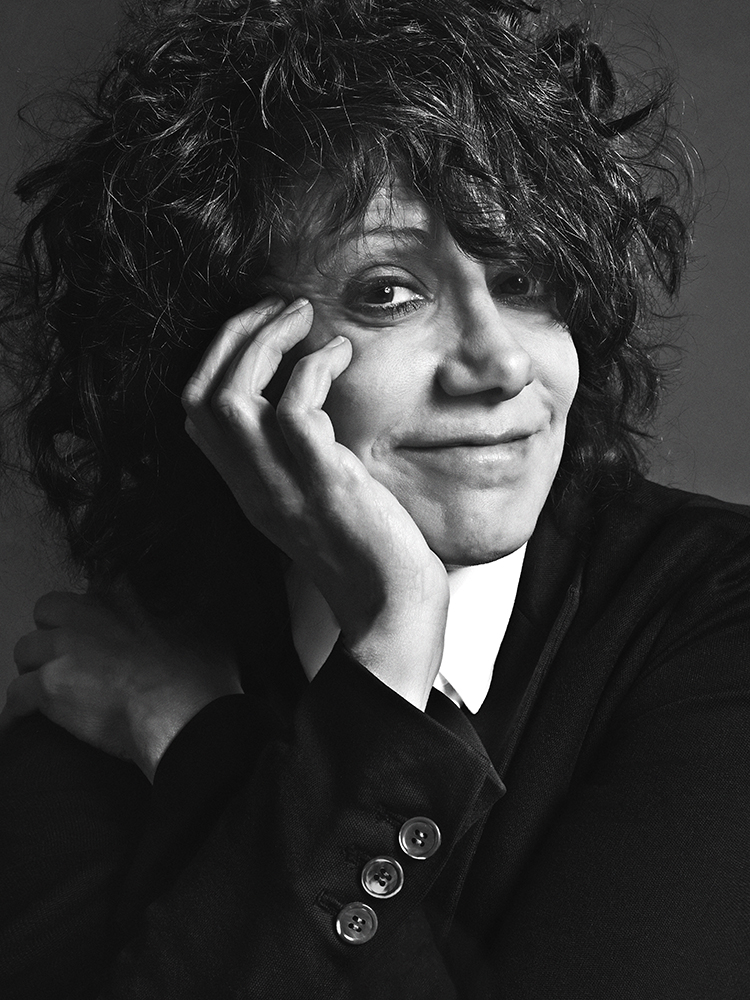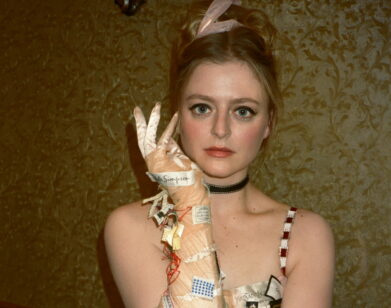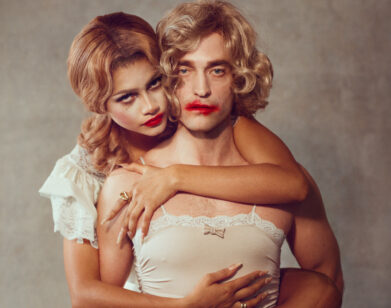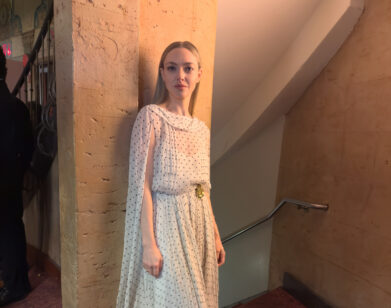This Is An Amy Heckerling
AMY HECKERLING IN NEW YORK, APRIL 2016. PORTRAIT: JAMES RYANG. GROOMING: LAURA DE LEON FOR CHANEL/JOE MANAGEMENT.
The purple clogs. The white collarless shirt from Fred Segal. The talking baby. The tasty waves. The Hait-e-ans. Sean Penn as Spicoli. During the decades she’s worked in (and around) Hollywood, writer-director Amy Heckerling has unleashed some of the most memorable, beloved, and zeitgeisty comedies and characters on the American viewing public. Her movies work as an internal index as to who, when, and where you were at a certain age, a certain place, and a certain psychology when you first saw them; classic is perhaps too broad a term to encapsulate their simultaneous wide-spread appeal and precise intelligence.
This weekend, Metrograph will show a two-day retrospective of four of Heckerling’s films in 35mm, including her 1982 feature debut, Fast Times at Ridgemont High, the iconic SoCal comedy that launched the careers of Sean Penn, Phoebe Cates, and Jennifer Jason Leigh; her gangster movie parody Johnny Dangerously (1984); Look Who‘s Talking (1990, and yes, with Bruce Willis as the verbose infant); and Clueless (1995), a rethinking of Jane Austen’s Emma set in the Beverly Hills of the high ’90s, which created a vernacular so idiosyncratic and so compulsively quotable its place in the annals of the cult hit is immeasurable.
Heckerling, a lifelong New Yorker, stopped by the Interview offices last month for a long-ranging, no-bullshit conversation about her work and why her creative output hasn’t always aligned with her ambitions. While a Broadway production of the Clueless musical is in the works, and Heckerling has an under-wraps writing project in motion (“I have an upcoming idea, but you know the evil eye…” she shrugs), the 62-year-old doesn’t mince words about her experience working as a woman within the Hollywood system.
COLLEEN KELSEY: What was your reaction when Metrograph approached you to put together a series?
AMY HECKERLING: It was kind of crazy because I have never been approached to do that. Maybe some people have some idea that I do a certain kind of thing, but I don’t feel that.
KELSEY: When you say that people have an idea that you do a certain kind of thing, do you mean comedies, or a particular take on coming-of-age stories?
HECKERLING: I don’t know if it’s like teen, slob, comedy…I don’t know. As a female you can’t just say, “I think I want to explore.” You’re always trying to figure out how to just stay in the game. What I may have felt like doing, and what I wound up doing, aren’t exactly the same thing. You develop a number of projects and it’s not always the right ones that get made.
KELSEY: When did you realize that filmmaking was something that was even a possibility as a career?
HECKERLING: Never. [laughs] I still don’t. Films were my babysitter. My parents both worked. They’d leave me at one grandparent in Brooklyn, and one grandparent upstairs in the Bronx, and I would just watch old movies constantly. My two first loves were James Cagney and Speedy Alka-Seltzer. [laughs] Then I went to the High School of Art and Design and there was this small group of boys that were talking about making films, like three of them, and I was so insanely jealous. It hit me that I was insanely jealous because, who told them they could do that? Movies were these magical things that came from somewhere out of your TV set and who said they were allowed to pick up cameras? My family didn’t even have a still camera. This was going back before everybody had cameras with them 100 percent of the time.
I was 14 when these guys were doing that. I didn’t even know anybody with a real movie camera. It was all theoretical. I was studying photography, which was really hard. Not because of photography, but because of trying to scrape together the money for printing paper and for film. If you tried to make an enlargement and you didn’t have the exact right settings and it came out dark you had to beg, borrow, and steal another piece of paper from somebody and it was so expensive and it was driving me nuts. I always had jobs after school that didn’t pay enough. The idea of film that kept going by was, “Oh my god how can anybody afford to do that? Where do you even learn?” I realized that I wanted to go to film school and learn how to do it. After doing as much research as I could, I realized that I would die if I didn’t get into NYU.
KELSEY: Did you make your first film during film school?
HECKERLING: Yeah. In fact, that was the first time I’d even had a movie camera.
KELSEY: What were the stories that you were interested in then? What were your ambitions?
HECKERLING: This was when I was in my teens and I spent all my time at the Museum of Modern Art. They’d let you have a pass if you went to art school really cheaply so I took advantage of that. I was into foreign films, old movies that I’d always loved, and crazier surrealistic stuff, which was like, “Oh my god how is it possible that you could just slit somebody’s eyeball and that’s a movie!” It was just the coolest thing ever. So, I wanted to do things like that.
I made my goofy little one-minute movie and a two-minute movie and people would look at them with confused faces and then one day, I don’t even remember what the movie was, but I was trying to be funny instead of surrealistic, and people laughed instead of looking at me like, “You’re nuts.” That was a very nice feeling. Then I worked with this other film student and the two of us, we didn’t have sound equipment, so I said, “Let’s make a silent film, it takes place with people now but there will be cards saying what they’re thinking.” We messed around with that. Then the guy and I had a falling out and he stole the prints. So… there goes my lost film. When I was a junior, I made a musical because NYU was going broke, about kids trying to save their school in the sort of Andy Hardy vein. It was the late ’70s, so everybody had schlepped up bell bottoms and long hair, but they were talking like they were in a 1930s movie. That was kind of nutty and that won the festival, and I was very happy. Then they let me into AFI and I made a film there.
KELSEY: What was that transition like, moving to Los Angeles?
HECKERLING: I felt so horrible my first couple of years in L.A. I didn’t drive. I failed the driver’s test five times. I was completely at the mercy of any of my friends who had cars, which makes you feel like an infant. After being a 13-year-old on the subway going any place you want to suddenly being 20 and being like a prisoner, that sucked. I had no idea that the weather was the way it was. I had two pairs of corduroy pants. I get there and I go, “Oh my god!” I had experienced heat but this was like horrible dry, rip your skin off, going crazy heat. Besides that, it was the whole thing of once again trying to make enough money to get your film out of the lab. It was hard.
KELSEY: How did Fast Times come to you?
HECKERLING: I got a job at Warner Brothers and they invited me to write and hopefully direct something that went to turn around, and that went to Universal and got notes. It went to MGM and was shooting and they dropped it during the actor’s strike. So this thing I’d poured all of my hard work into was basically garbage, because all of the money that they’d spent in pre-production would be against anybody buying it. I couldn’t use it; it belonged to another studio. That was horrible. But some people came and they had independent money to rewrite it again and blah, blah, blah. That’s languishing, and Art Linson showed me Fast Times. I knew him from when I’d been at Universal. He was a producer with a deal there and he would show me things that he was working on and I would tell him what I thought. I gave him some of my ideas. That was cool.
I read the script and it was wonderful, but it had a lot of studio-ish-ness in it. I found out it was based on other material and I asked to read [Cameron Crowe’s] book. The book is amazing. Every single thing, you go “Yeah, yeah, yeah,” because they’re all real. If you don’t relate to one person, you relate to another, but you know the other people or you’re interested in people from that kind of place. So the idea that people are in a swimming pool, like what the hell is that? Then someone has a crappy job, but they have a car. At that point in time it was reflective of the late ’70s, which was a very depressed time in the country. It was one of the first times that people thought young people were going to do worse than their parents did. If you were in New York every week there was a strike and the garbage was taller than your head and everything was covered in graffiti and crime was all over the place. It was a different world, and it was a different world on the west coast too. I liked that aspect of young people having to deal with a world that’s not going to be as good. Their dreams are being squashed down a bit. How do they get along with their lives and get together?
The Brad Hamilton [Judge Reinhold] character, his self-worth came from being at the best burger place. So then to lose that and to be at a worse burger place, and then to be at a 7-Eleven… All of those things happening to the other people were such a great contrast to what Sean Penn was going through. He had no job. I don’t know where the hell he got money for his drugs. Yet he somehow enjoyed nature. It didn’t occur to him that people would be mad at him. I thought, “Where does this insane optimism come from?” It’s an amazing quality, and the bad stuff happening to everybody does not affect someone that knows how to enjoy life like that. This was all very confusing to me, but it seemed to work.
KELSEY: Cher in Clueless has a lot of that same optimism that Spicoli does, where she is impervious to everything and still marches on. Before the film, there was the idea was to have Clueless as a TV pilot, but where did that idea first come from?
HECKERLING: Well I would drive around, and you think. People would show me stuff they thought I could handle because it’s similar enough to what I have done. You don’t trust women with many things, and the only person that would give me their best script is me. So what do I like? I thought, “What have I ever done that seemed to have worked, and what kind of characters do I like seeing?” I liked Spicoli a lot. No, I love Spicoli. That optimism fascinated me. There was another movie out, Ed Wood [1994], which had a very optimistic lead character and I thought it was hilarious.
Imagine going around the world: everybody thinks you stink and you think you’re great. How wonderful is that? Who says you have to think what other people are thinking? Why not wear rose-colored glasses? Then I thought, well what if I was going to write a character that was the opposite of me? Instead of thinking about how hard something will be, think “I can do whatever I want.” You get dressed. You think everything looks crappy, just assume it all looks great. Go places and think people like you. If your father yells at you, you think it’s kind of funny that he talks that way. It just was so easy. Then I go, “Where is this girl in the happy bubble? What’s her environment? What’s her story?” I thought of Emma. I actually remember when I was in college reading Emma and thinking, “Say, I’ve seen this before.” It was a Gidget episode. I thought, “Hey, wait a minute, did Jane Austen steal this from Sally Field?” All of that was very enticing. It’s a plot. It’s got elements of “Uh-oh I created a monster and I’ve done something wrong. I’ve never done something wrong, how does that feel? What should I do?” Personal growth. But it’s all very fun and it all works out well in the end. It just seemed like the perfect skeleton. I was re-reading Emma and I was going “This is so good, this is so good!” Everything in it is just so perfect.
With Alicia, I was writing when the Aerosmith videos came on. The first one was “Cryin’.” It was “Cryin’,” “Amazing” and…
KELSEY: “Crazy.”
HECKERLING: The one where the guy steals her purse [“Cryin'”], I just saw her and went, “Oh my god, look at her.” She is like a kid, she is adorable, you feel for her… She is beautiful. Her performance in the video—I believed everything. I just went crazy for her. So when I handed the script in, by that time the “Crazy” video was out and I videotaped it. I gave it to the studio and said, “Think of this girl when you read it,” and they said “Oh, Liv Tyler?” And I went, “No!” Meanwhile my friend, the casting director, was saying “You’ve got to see the girl in The Crush.” Well, it’s the same girl.
KELSEY: The world that is created in Clueless is so precise, down to the language, which I have so many questions about because I know you sat in at Beverly Hills High to do research. The dialogue is also so rat-a-tat-tat and almost choreographed; were you just playing around with that while writing the script?
HECKERLING: I read one slang dictionary… this was before you could find anything online.
KELSEY: Right. Pre-Urban Dictionary.
HECKERLING: I think that had the Baldwins and the Monets. An actor came in and said “aggro,” and he said, “Can I say ‘postal?'” I went, “Sure.” It seemed like such a great descriptive word. There are a lot of great slang words that are in films that I just don’t like, even now. I will go to my daughter and say, “Do you really say ‘jelly?'” And something being “on fleek.” That one itches me.
It depends on the context, but at that time there were a lot of wonderful words and it wasn’t just like, “Oh, it’s teen slang” because teen slang can have urban slang, it can have rich kid slang, it can have things that come up out of prison, things that come from the gay community. Any group that wants to separate themselves is going to form a secret language. That’s always been the way. Like, Cockney. That’s an awesome secret language. So, I was compiling lists and of course not everybody would use the same words. Also, Yiddish was a dying language, which I think is so expressive and in “Coffee Talk” [on SNL], [they] had been sort of saving it. “Verklempt.” I thought, “What’s verklempt?” [laughs] I thought it would be so cool if the black couple were based on my parents. They fight over nothing. If they’re in a car together, they’re yelling over how to get to some place and I thought it would be funny if they were using Yiddish words. I wrote them as an old Jewish couple. Of course a lot of the white kids are trying to sound black, and then “as if,” I had first heard from my gay friends. Then I have a character come in, and there was a sort of a swinger resurgence, I thought he could talk like he was in the Rat Pack where they have amazing Sinatra jive talk. I thought, “We will give him his own language so that even those who speak slang say, ‘What the hell is he talking about?'” I was just having a lot of fun with that.
KELSEY: “You’re a virgin who can’t drive.” It’s the ultimate insult for Cher, but also completely ridiculous how Tai [Brittany Murphy] delivers it. Where did that come from?
HECKERLING: Well, that came from my self-doubt because I was the last American virgin. I didn’t know anybody who didn’t have a boyfriend when I still didn’t and I failed the driver’s test five times. These things make you feel like a loser. So to have somebody just hit you right where it really hurts…
KELSEY: And the “This is an Alaïa” scene, where Cher gets mugged?
HECKERLING: I was having dinner a couple of agents and they told me about another agent that wore the same suit all the time. Not a fancy guy. Then he got married and this woman remade him; he had all these Armani suits. He wasn’t the kind of guy that felt comfortable in any of this, and he just knew that this was what he was doing because she wanted it and insisted on it. Suddenly he had to go out wearing this stuff, and he got held up, and the mugger said, “Get on the ground!” He said, “But this is Armani!” It wasn’t like he loves Armani, it was more like he was more afraid of his wife than a guy with a gun. I thought that was so hilarious and it also reminded me of… I don’t know if you know the longest pause of dead air on radio?
KELSEY: No, tell me.
HECKERLING: It was Jack Benny. He does a little sketch with someone. He holds him up and he says “Your money or your life!” and there is all this dead air. So he says, “Well?” and the other goes, “I’m thinking.” [laughs] It just seemed perfect for her.
AMY HECKERLING WILL APPEAR IN PERSON AT SCREENINGS OF FAST TIMES AT RIDGEMONT HIGH AND CLUELESS THIS WEEKEND AT METROGRAPH, 7 LUDLOW STREET. VISIT THE THEATER’S WEBSITE FOR INFORMATION.







